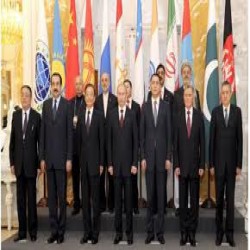Analytics
The best Experts' Views, Marks and Forecasts on Economics >>
Rules of Entry and Participation. Become a Member of Professional Society of Economic Journalists! >>

MOSCOW, (Itar-Tass) —— An expanded meeting of the council of heads of state of the Shanghai Cooperation Organization (SCO) was held in St.Petersburg on Monday. The meeting discussed problems of Europe and the United States, as well as the coming recession and ways of warding off those threats. There was one more problem, which was of special interest for the SCO member countries – a possibility of a new financial crisis.
During the meting Russian Prime Minister Vladimir Putin suggested the signing as soon as possible of a list of measures, to be taken within the framework of the programme of trade and economic cooperation of the SCO member states, The Kommersant writes. Besides, he supported the idea of attracting other countries to cooperate with SCO.
Rossiiskaya Gazeta reminds that, aside from Russia, SCO includes China, Kazakhstan, Kyrgyzstan, Tajikistan and Uzbekistan. It was decided at the talks that consultations on the level of ministers of economy and finance, as well as heads of the Central Banks, would be held regularly. SCO members believe a joint interstate reserve bank or fund should be created.
On the tenth anniversary of the creation of SCO, more guests came to St.Petersburg, than the SCO format envisaged, The RBK Daily writes. Officials and observers from Iran, India, Mongolia, Pakistan and Afghanistan came to attend the meeting. Afghanistan submitted an application for the admittance to SCO in 2011.
Russia and China are willing to help Europe within the framework of IMF, but not in exchange for a more loyal attitude to our energy project (Nord Stream and South Stream), the Russian Prime Minister said, refuting the thing that was almost obvious. The SCO countries “are going to establish a more just world order, which would open up equal access for all to the advantages of globalization,” says a joint statement of the prime ministers.
Andrei Karneyev, director of the Institute of Asian and African Studies under the Moscow University, said in an interview with Nezavisimaya Gazeta that SCO had played a positive role in the stabilization of the situation in Central Asia on the initial stage of its work. “SCO resisted three evil forces in the region – terrorism, separatism and transborder crime. Joint anti-terrorist military exercises were held,” he continued.
According to Karneyev, “at present the main threat to the security of the SCO member countries comes from Afghanistan. The problem of the legitimate change of rulers in the Central Asian countries is also a serious challenge. In this respect SCO could become a suitable place for the coordination of interests by members of the group.” SCO cannot be an alternative to NATO, however.